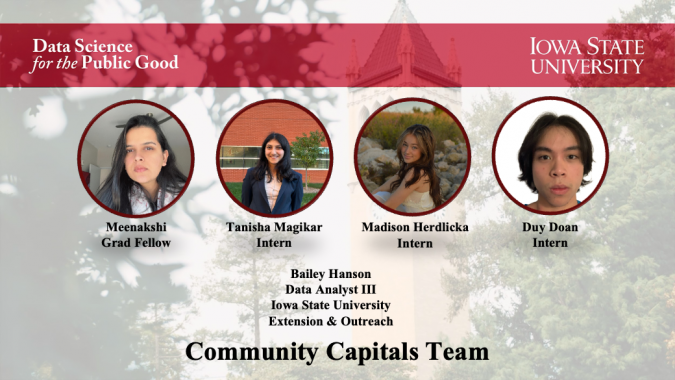This Page is being updated for 2025
The final presentations for the 2025 Iowa State University Data Science for the Public Good (DSPG) program take place at 10:00 AM, July 23th at the Student Innovation Center Room 0114. Links to the recorded presentations will be available below following the presentations. Questions regarding DSPG can be sent to dspg@iastate.edu.
DSPG Disclaimer: Please note that the data and results presented are student work. While the students strive to be as complete and accurate as they can, this is also a learning internship and therefore errors may exist. Following these student presentations, faculty and staff review the data, scripts and results before use in final publications.
Our Program for the Final Presentations on July 23rd
| 10:00 - 10:15 | Introduction to DSPG |
| 10:15 - 11:05 | Presentation: STEM Education |
| 11:05 - 11:20 | Session Q&A |
| 11:20 - 12:10 | Presentation: Community Capitals |
| 12:10 - 12:25 | Session Q&A |
| 12:25 - 12:30 | Concluding Remarks |
 |
From Classroom to Career: The Status of STEM in Iowa Despite the recognized importance of STEM initiatives, there remains a lack of comprehensive and actionable data on the availability and distribution of STEM resources within Iowa communities. It is unclear how extensive these resources are and how effectively they can be mobilized to support STEM education development. Additionally, a deeper understanding is needed of the factors influencing students’ decisions to pursue STEM education in Iowa, such as access to local job opportunities, educational infrastructure, participation in science fairs, and extracurricular programs. This project seeks to address these gaps by developing a centralized, user-friendly data repository along with visualization tools that present clear and contextual information. These resources will serve Iowa’s policymakers, educators, advocates, and community stakeholders by informing strategic decisions, guiding investments, and supporting targeted policy interventions to strengthen STEM education throughout the state. |
 |
Building Resilience: Analyzing Civic Infrastructure as a Community Compass The Community Capitals project seeks to explore the relationship between community capital indicators and the overall condition of communities in Iowa, aiming to identify strengths, weaknesses, opportunities, and gaps within these communities. The main work focuses on major events such as natural disasters, job losses, new job creation, school closures, and new opportunities for tourism and healthcare. The study seeks to identify the most relevant community capitals, trends over time, and the impact on community resiliency, by analyzing correlations between various indicators and comparing quantitative data with some qualitative insights. |
